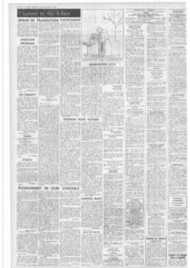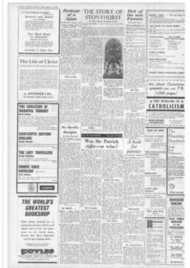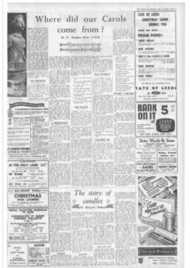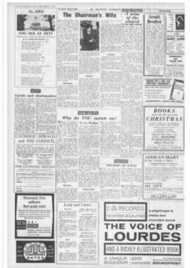Page 2, 7th December 1962
Page 2

Report an error
Noticed an error on this page?If you've noticed an error in this article please click here to report it.
Tags
Share
Related articles
Tribute Marred By 'small Men' Reference
Punishment M Our Schools
Catholics And Borstal System
The Injustice Done To Fr. Leetham
Apostolate & Schools
PUNISHMENT IN OUR SCHOOLS
Fr. Leetham has obviously mellowed since I was a pupil at Ratcliffe, for I can recall many times he sent me to be caned-never for running down a corridor, but for playing cricket in front of the pavilion, which for some reason was forbidden.
Not that I hold this against him. I don't feel bitter and twisted as a result. Many was the time I flicked inky pellets at my classmates in lower school. Pious exhortation had no effect at all. I construed it as a sign of weakness. Caning provided the short, sharp shock and was useful as a deterrent. The real criteria was justice. Was it fair? After the fourth form, appeals to my better nature had some effect. I could see the master's point of view arid the necessity for rules of some sort. How nice it would be if one was amenable to reason at a much earlier age, but then if we were all amenable to reason we should never have gone into Suez, persist in maintaining our own nuclear deterrent, allow President Tshombe to get away with it in Katanga, etc., etc.
Bruce M. Cooper
Linthorpe, Middlesbrough.
It is just possible that there are priests and religious who teach and are as deeply religious and as highly intelligent as Fr. Leetham who, after weighing up the pros and cons of each form of punishment, sometimes feel conscience-clear in using corporal punishment. Does Fr. Leetham hope to convert them to his point of view by calling them "child-beaters", "arrogantly slick", "unintelligent", "ridiculous" and "crude"? I do not consider the use of such words as a good substitute for sound advocacy of a cause.
W. D. Farrell London, S.E. 9.
Since you published my letter on November 2, a government report has been published called "The Health of the School Child, 19h0-1961" by the Chief Medical Off. •er of the Ministry of Education.
I would like to draw attention
to the following short extract from a more detailed report which would seem to leave in no doubt whatever the possible lasting ill effects by beating on the palms of the hands.
"Contracture of the fingers from changes in the fascia of the palms of the hands was demonstrated by Dupuytren as long ago as 1832. More recently, histological examination of palmer fascia showed ruptured fibres with thickening nodules. There is increasing evidence that the condition is probably due to repeated trauma. Mr. T. E. A. Stowell, F.R.C.S., in a review of the subject mentioned that he found 30 cases in nonmanual office workers aged 25-40 who had all attended one school where 'free use was made of caning on the hands'. Mr. Stowell, using a dynamo meter found that a cane 'wielded by a healthy young schoolmaster struck the palms with an explosive violence of 120 lb. and the area of impact was 3 x A inch'. His opinion was that repeated caning 'may be a precipitating cause of this contracture'.
"Nowadays, frequent and severe caning of the palms of children is uncommon; even so the risk of delayed and permanent injury to the fingers from repeated caning should he made known to the teachers."
Patricia Sillem ("Puzzled")
Wimbledon, SW. 19.
Surely the whole deterrent value of corporal punishment depends upon it being used infrequently as a means of maintaining discipline, and then only for serious offences. Too great a use defeats the whole purpose of the punishment, and this applies equally well in the home as in the school.
Jean A. Howard (Mrs.)
London, W2.
Father Leetham is quite right in saying that his system invites boys to "play a game with discipline" I know of one "league" run by the second and third forms in one of our schools, In the first term of last
year, one J. Bloggs of 3C was league leader; he had received 43 strokes of the cane, between September and November. To boys like this, the cane is no deterrent.
The system, however, has its partisans. I have heard it defendad on the grounds that, because every boy will experience pain as an adult, he ought to experience it as a child. The logic of this is beyond me.
Recently I have taken up a post in a Training College. One of my main objects in life is to convince my students that they should not begin teaching with a text book in one hand and a stick in the other. Already, I have my disciples. Perhaps the whole unsavoury system will go one day.
"No Stick".
I have delved further into the grim origins of the word 'ferule'. and in so doing I found what may well be one of the reasons for the outcry against the use of this instrument in Jesuit schools.
For the word is obviously formed by the crasis of the two Greek words0HP (FER) and 'YAA (ULA) which mean respectively 'wild beast' and 'wood' (this latter explains the reference to 'whalebone' in a previous letter). Parents will. of course, be horrified le think that their children are being punished in a pseudo-Colosseum, even though the wild beasts are made of wood.
The Latin scholar who quotes Juvenal was more fortunate than most. The people who administered the ferule to roe and my contemporaries had the good sense thwart this trick by the simple expedient of holding the target with whichever hand was not required for the crucial operation: this successfully frustrated our subversive tactics.
I would like to end on a note of warning to those scholars who wish to check the accuracy of my Greek references-take it with a pinch of Giant Fennel!
A. Everson
London, S.W. 20.
blog comments powered by Disqus

















